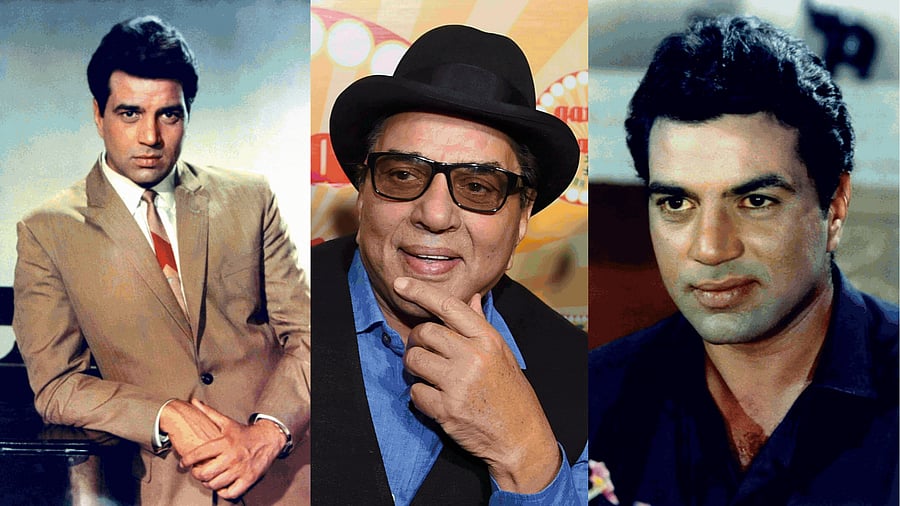
Dharmedra's iconic films
Special Arrangement
Some lights never go out, they will lighten up the environment and then just move to another sky. Dharmendra, the man who made India laugh, cry, and believe in love’s madness, was one such star and has left for that sky today. From there also, we can almost hear him say, 'Zindagi ittefaq hai…' (life is a coincidence). Such was his persona... Such was the man - Dharmendra.
Born in a small village called Nasrali in Punjab’s Ludhiana district in the year 1935, Dharmendra came to Bombay with nothing but dreams in his eyes and commitment in his heart. A man who belonged to cinema, his journey too was nothing short of a cinematic story. He started as a young man in Dil Bhi Tera Hum Bhi Tere (1960) and went to become a towering figure who not only defined what it meant to be a Hindi film hero, but also became a reason for others to dream about achieving everything with nothing in hand.
His association with the phrase, 'He-Man of Bollywood,' does not do justice to his persona. More than that, he was also the beating heart of a generation. When he made his debut in 1960, the industry already had big names like the tragedy king Dilip Kumar, the evergreen Dev Anand and the showman Raj Kapoor, but soon Dharmendra became the face of a charming, handsome and strong hero who could smoothly manage do romance, comedy, tragedy and action. That too with so much ease that it all looked very real.
The same Dharmendra who in Sholay (1975), as Veeru, told us that friendship could be bigger than everything in life. 'Yeh dosti hum nahi todenge' (We will not break this friendship) isn’t just a line, it is an oath of friendship for all of us. Ask anyone and they will tell you- between Jai and Veeru, the latter is their first choice as a friend. The man who had made us laugh by standing atop water tank also showed the quiet fire of Satyakaam (1966), where he simply whispered truths about integrity and pain: 'Sachai aur imandari insaan ke sabse bade gun hain'. (Truth and honesty are the biggest of virtues of human). On one hand, he was the joker on screen as Veeru and on the other, he also became the moral compass who made us weep as Satyapriya in Satyakaam.
Then there was another Dharmendra who neither making us laugh, nor speaking truth on the face of society but gently and beautifully stealing hearts. In playing of Ashok in Anupama (1966), he spoke in silence that was poetry, his eyes, with gaze deeper than poetry, were enough to convey the love. When he said 'Hum botany ke professor hain, romantic literature ke nahi' (I am a botany professor and not of literature) in Chupke Chupke (1975), love and romance were very much with him as his inseparable props.
Phool Aur Patthar (1966), Bandini (1963), (1964), Guddi (1971), Mera Gaon Mera Desh (1971), Dream Girl (1977), Dost (1974), Charas (1976)... These are some of the magical performances that Dharmendra gave and these are just few, there are many more. In each of these masterpieces, Dharmendra spoke a language no script could teach. It was the language of of heart, honesty, and timeless warmth.
In Phool Aur Patthar, he portrayed a man rough on the outside but tender within which was a true reflection of himself. The rawness he showed in Mera Gaon Mera Desh, spoke for all of us. The handsome man with infectious smile in Dream Girl and Shalimar charmed all of us. With a range that could make you laugh in one scene and ache in the next, he found a place for himself in audience heart.
His films were never just entertainment, rather an emotion in motion. With his captivating screen presence, he could ensure that strength, laughter and tenderness exist in the same frame, at the same time. Due to his ease only, it's not hard for us to imagine him, teasingly saying, 'Kutte, main tera khoon pee jaaunga!' and then breaking into that infectious, boyish laugh that he always had on his face.
Rest in peace, Dharam ji. You have left us for a better world, but your immortal work will always be with us on our screens, in our memories.
'Yeh dosti hum nahi todenge ...' — not today, not tomorrow.